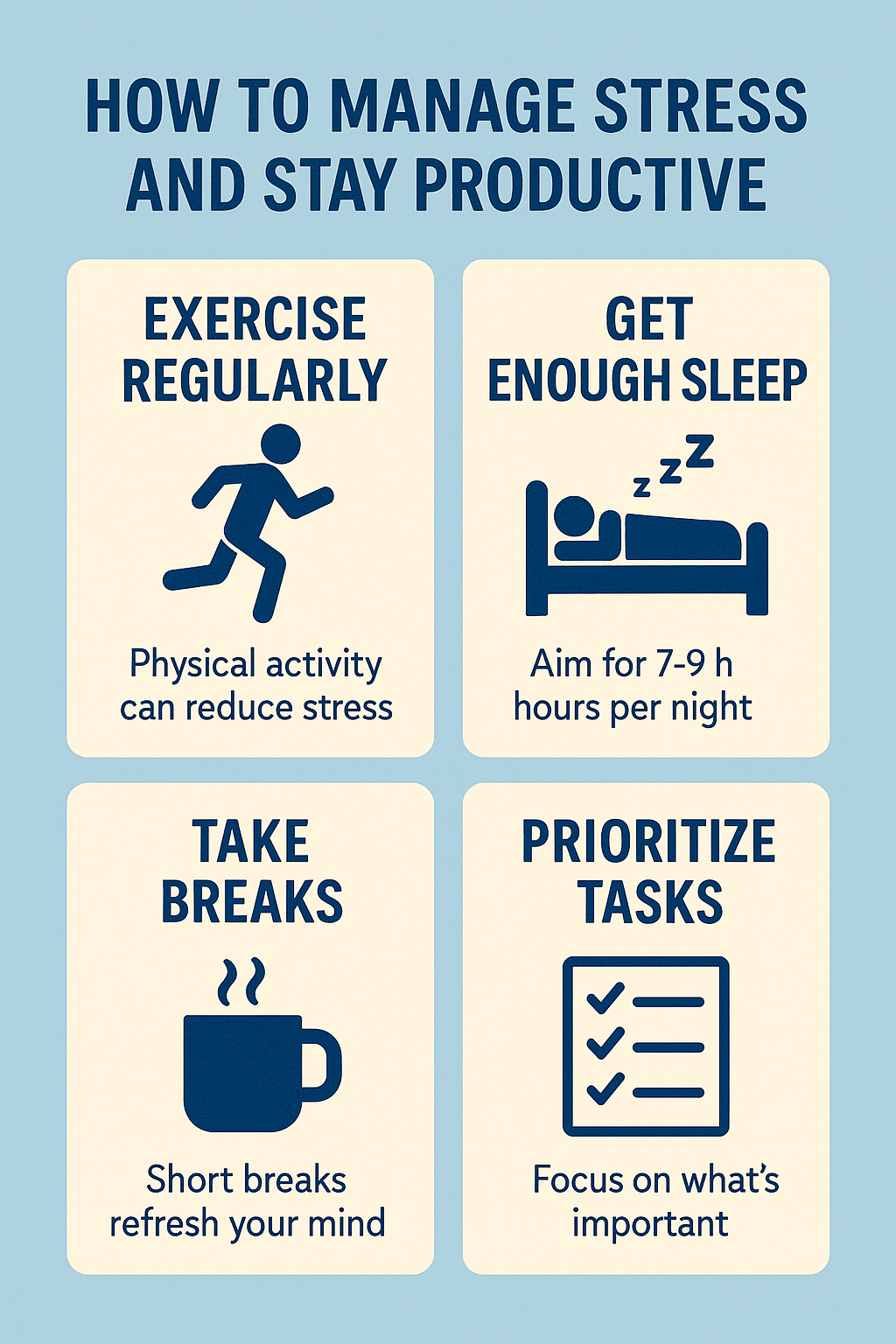Stress is an inevitable part of life, but how we manage it can make all the difference in our ability to stay productive. While some stress can motivate us to perform at our best, chronic stress can impair focus, decrease performance, and negatively affect our health. Learning to manage stress effectively is crucial for maintaining both well-being and productivity. In this article, we’ll explore strategies for managing stress while staying productive.
1. Recognize the Signs of Stress
The first step in managing stress is recognizing when you’re experiencing it. Stress can manifest in many ways, including physical symptoms like headaches or muscle tension, emotional symptoms like irritability or anxiety, and behavioral symptoms like procrastination or sleep disturbances. Being aware of these signs allows you to take proactive steps to manage stress before it becomes overwhelming.
Tip: Pay attention to your body and mind for signs of stress. The earlier you recognize the symptoms, the easier it will be to manage and address them.
2. Break Tasks Into Smaller Steps
Stress often arises when tasks feel overwhelming or unmanageable. One of the most effective ways to reduce stress and stay productive is to break tasks into smaller, more achievable steps. By focusing on completing one small task at a time, you reduce the mental burden and make progress without feeling overwhelmed.
Tip: Start by breaking your larger tasks into smaller chunks. Tackle one step at a time, and celebrate your progress along the way. This keeps you focused and reduces feelings of being overwhelmed.
3. Practice Deep Breathing or Meditation
Deep breathing exercises and meditation are powerful tools for managing stress and improving focus. Taking a few minutes to focus on your breath can help calm your mind and body, reduce anxiety, and reset your mental state. Meditation and mindfulness practices can also improve concentration and enhance productivity.
Tip: Take a short break during your workday to practice deep breathing or meditation. Even 5-10 minutes can help you relax, refocus, and reduce stress.
4. Prioritize and Delegate Tasks
When you’re feeling stressed, it’s easy to take on too much. One of the best ways to manage stress is to prioritize your tasks and delegate when possible. Identify the most important tasks that require your attention and focus on those. Delegate less critical tasks to others to lighten your load and reduce stress.
Tip: Make a list of your tasks for the day and prioritize them based on urgency and importance. Delegate tasks that others can handle and focus on what truly requires your attention.
5. Take Regular Breaks
Working non-stop can increase stress and decrease productivity. Taking regular breaks allows your mind to rest and recharge, improving your focus and energy levels. Breaks also provide an opportunity to step away from stressful tasks and gain a fresh perspective.
Tip: Use the Pomodoro Technique: work for 25 minutes, followed by a 5-minute break. After four sessions, take a longer break. This helps you stay productive while preventing burnout.
6. Stay Organized
Disorganization can contribute to stress, as it makes it harder to stay focused and on top of tasks. Keeping your workspace and schedule organized reduces mental clutter and makes it easier to stay productive. When everything is in order, you can focus on the task at hand without worrying about disorganization.
Tip: Take a few minutes each day to organize your workspace and plan your schedule. Use digital tools like to-do lists or calendars to stay on track and reduce stress.
7. Maintain Healthy Lifestyle Habits
Stress management goes hand-in-hand with maintaining a healthy lifestyle. Exercise, proper nutrition, and adequate sleep are essential for managing stress and staying productive. Physical activity releases endorphins, which improve mood and reduce stress. A balanced diet and quality sleep help you maintain focus and energy levels throughout the day.
Tip: Make time for regular exercise, eat nutrient-dense meals, and ensure you’re getting 7-9 hours of sleep each night. A healthy lifestyle supports your ability to manage stress and stay productive.
8. Set Realistic Expectations
Setting unrealistic expectations for yourself can increase stress and lead to burnout. It’s important to recognize your limits and set achievable goals. Being realistic about what you can accomplish in a given time frame helps you manage your workload without feeling overwhelmed.
Tip: Set achievable goals for each day and break them down into manageable tasks. Don’t be afraid to adjust your expectations if needed, and remember that progress is more important than perfection.
9. Stay Positive and Practice Gratitude
A positive mindset is an effective tool for managing stress. When you focus on the positive aspects of your life and work, you shift your attention away from stressors and increase resilience. Practicing gratitude helps you stay grounded and appreciate the progress you’ve made, which can reduce stress and increase motivation.
Tip: Start or end your day by writing down three things you’re grateful for. Focusing on gratitude helps you stay positive and reduces stress by shifting your focus to the good in your life.
10. Seek Support When Needed
Sometimes, managing stress requires help from others. If you’re feeling overwhelmed, don’t hesitate to reach out to friends, family, or a professional for support. Talking about your stress can provide relief and offer new perspectives on how to manage it effectively.
Tip: If stress becomes too much to handle on your own, seek support from someone you trust or consider speaking with a therapist or counselor. Don’t be afraid to ask for help when you need it.
